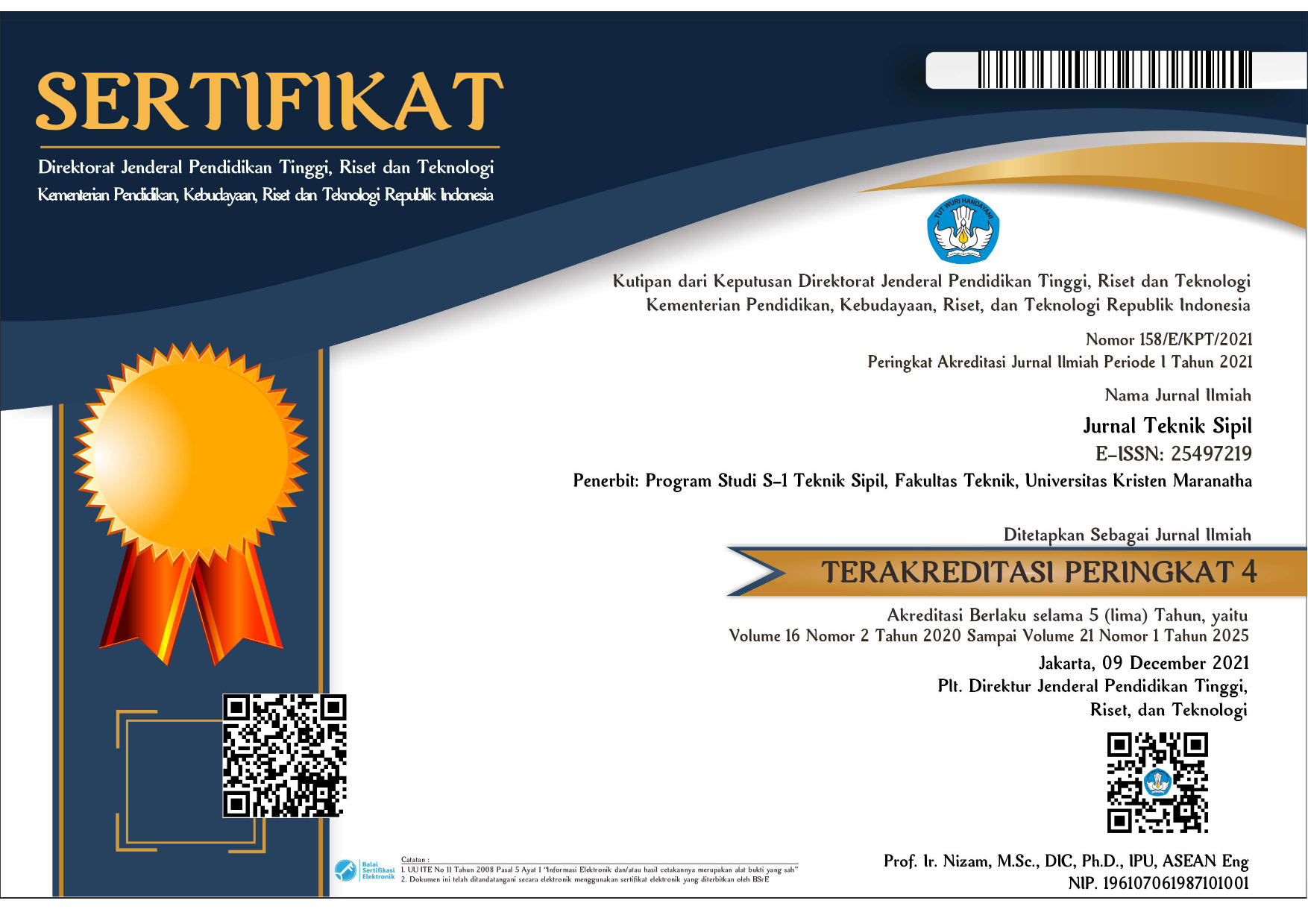Effect of Coefficient Nk on Gedebage Soft Soil Shear Strength Based on CPTu Test
DOI:
https://doi.org/10.28932/jts.v20i1.6194Keywords:
CPTu, Shear Strength, Soft SoilAbstract
Cone Penetration Test field instrument, also commonly refered to as sondir, has been commonly used in Indonesia. However, the usage of Cone Penetration Test in combination with pore water measurement (CPTu) is not yet used widely, which is why this research is conducted in situ by using CPTu instrument. In situ testing has a few advantages, such as:soil parameters are obtained under actual stress conditions, continous data can be obtained along the depth of soil, and it overcomes sampling problems or sample interferences. Location of this research is in Gedebage area of Bandung which currently undergoes major development. Soil in the area are soft soils which commonly have low shear strength. Soft clay shear strength (Su) can be determined by the ratio of net cone resistance and conus factor (Nkt). Further research on Nkt coefficient on soft soil shear strength evaluation based on CPTu test results are going to be verified by using laboratory testing. The research shows that Nkt coefficient which are suitable for Gedebage area ranges from 13 - 15. Range of shear strength parameter based on the laboratory test and in situ CPTu test calculations are as the following: depth of 0-10 m Su >25 kPa, depth of 10 - 25m Su is around 10 kPa, and depth of 25 - 31m Su > 100 kPa.Downloads
References
Bjerrum, L., & Anderson, K. H. (1972). In-situ Measurement of Lateral Pressures in Clay. Norwegian Geotechnical Institute Publ, 91.
Chan, D. H., & Law, K. T. (2006). Soft Soil Engineering: Proceedings of the Fourth International Conference on Soft Soil Engineering, Vancouver, Canada, 4-6 October 2006. CRC Press.
Desiani, A. (2017). Karakterisasi Tanah Lunak Cekungan Bandung Berdasarkan Uji in situ. Unpar.
Desiani, A. (2018). Kompresibilitas Tanah Organik. In Jurnal Teknik Sipil (Vol. 14).
Low, H. E., Lunne, T., Andersen, K. H., Sjursen, M. A., Li, X., & Randolph, M. F. (2010). Estimation of Intact and Remoulded Undrained Shear Strengths from Penetration Tests in Soft Clays. Géotechnique, 60(11), 843–859.
Lunne, T., Randolph, M. F., Chung, S. F., Andersen, K. H., & Sjursen, M. (2005). Comparison of Cone and T-bar Factors in Two Onshore and One Offshore Clay Sediments. Frontiers in Offshore Geotechnics, 981–989.
Mayne, P. W., Peuchen, J., & Baltoukas, D. (2015). Piezocone Evaluation of Undrained Strength in Soft to Firm Offshore Clays. Frontiers in Offshore Geotechnics III: Proceedings of the 3rd International Symposium on Frontiers in Offshore Geotechnics (ISFOG 2015), 1, 1091–1096.
Rahardjo, P. P. (2004). Soft Soil Engineering (Lecture Notes). Parahyangan Catholic University.
Rémai, Z. (2013). Correlation of Undrained Shear Strength and CPT Resistance. Periodica Polytechnica Civil Engineering, 57(1), 39–44. https://doi.org/10.3311/PPci.2140
Robertson, P. K., & Campanella, R. G. (1983). Interpretation of Cone Penetration Tests. Part I: Sand. Canadian Geotechnical Journal, 20(4), 718–733.
Wesley, L. D. (2013). Residual Soils and The Teaching of Soil Mechanics. Proceedings of the 18th International Conference on Soil Mechanics and Geotechnical Engineering, 3479–3482.
Downloads
Published
How to Cite
Issue
Section
License
Copyright (c) 2024 Asriwiyanti - Desiani, Daud R. Wiyono, Adrian Pramono

This work is licensed under a Creative Commons Attribution-NonCommercial 4.0 International License.


















